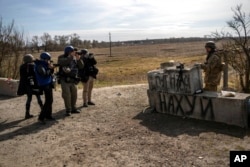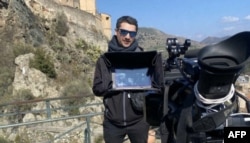The death of a French journalist in Ukraine this week is serving as a stark reminder of the risks for media covering the Russian invasion.
Frédéric Leclerc-Imhoff, a reporter for the French broadcaster BFM TV, was covering an evacuation operation in the city of Sievierodonetsk on Monday, when shrapnel hit him, according to Ukrainian and French officials.
His colleague Maxime Brandstaetter, who also reports for BFM TV, was injured in the same attack.
Sievierodonetsk, a key city in the Donbas region, is the site of intense clashes between Russian forces and Ukrainian troops.
Leclerc-Imhoff's death brings the number of journalists killed while covering the conflict in Ukraine since February 24 to at least eight, says the New York-based Committee to Protect Journalists (CPJ).
The nonprofit is examining a further seven cases to see if those journalists were killed while on assignment.
"Our main criterion in confirming cases when a journalist's death is related to their work is to establish whether a journalist was engaged in reporting, filming, interviewing or newsgathering," Gulnoza Said, CPJ's Europe and Central Asia program coordinator, told VOA.
She says the CPJ was "able to establish that Frédéric Leclerc-Imhoff and his colleagues were in the area for newsgathering."
In some cases, making that call is harder. "We need to collect more information before we can say whether they died as journalists or became casualties in this war," she said.
That includes RFE/RL journalist Vira Hyrych, who died in Kyiv in late April when a Russian airstrike hit the residential building where she lived.
Other media groups cite a higher toll for media in Ukraine. The National Union of Journalists of Ukraine puts the total number of media workers killed at 32. Among those are reporters conscripted with the military.
Said of CPJ told VOA, "We don't count those who worked as journalists before the war but enlisted in the army and died as combatants."
In Ukraine, incidents include journalists killed or injured on assignment, with IPI determining the majority were slain by Russian fire.
The risk of physical danger is a key focus for media rights and support groups, some of which set up resource and training centers.
The London-based Frontline Club opened a center in Lviv, in western Ukraine, in April to train journalists covering the conflict.
Four months into the conflict, the number of journalists arriving in Ukraine has not decreased, says British photojournalist Paul Conroy, who is on the board of trustees.
"We thought we might have to scale back our operations in Lviv as the war shifted from the region around Kyiv and the Ukrainians pushed the Russians back, but the numbers are picking up," he told VOA from Lviv.
Conroy estimates that up to 3,000 foreign journalists could still be working in Ukraine and says the unexpected nature of the conflict has kept it visible.
"There was a genuine thought that it would be a Russian walkover, and it's been anything but that," he said, adding that the fierce Ukrainian resistance has captured the attention of the world.
Conroy, who has covered conflicts around the world, including for the British newspaper The Sunday Times, says the Frontline Club has trained about 100 journalists in Ukraine, primarily freelancers.
Training focuses on safety, how to behave ethically on the front line, and recognizing weapons systems.
"No one can be 100 percent safe in the war scenario," he said, "But there are certain basics that if you know them, then you really increase your odds."
In the case of French reporter Leclerc-Imhoff, world leaders condemned the attack.
Ukrainian officials say Russian forces fired on an armored vehicle that the 32-year-old journalist was traveling in, and France has demanded an independent investigation.
The Kremlin has said it doesn't have information on Leclerc-Imhoff's death.
"To draw conclusions, you need detailed information about where it took place, under what circumstances, what is the truth, what is not. We don't have such information," Dmitry Peskov, Russian presidential spokesperson, told reporters Wednesday.
French authorities have opened a war crimes inquiry into the reporter's death and UNESCO Director-General Audrey Azoulay also called for an investigation to "identify those responsible for this crime and bring them to trial."
"Journalists who work tirelessly in Ukraine to inform us about the reality of the war must be protected from attack," Azoulay said in a statement this week.
Some information in this report came from Agence France-Presse.








